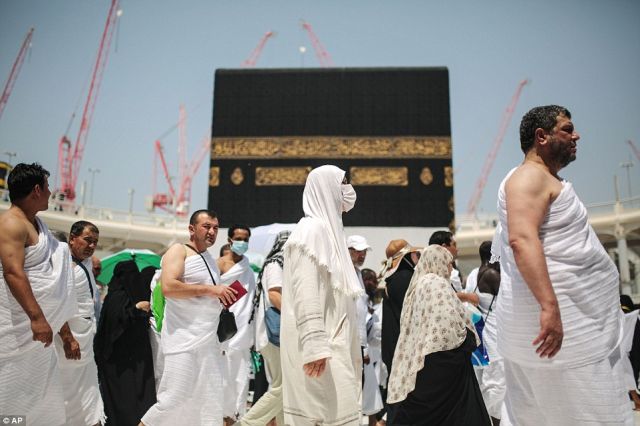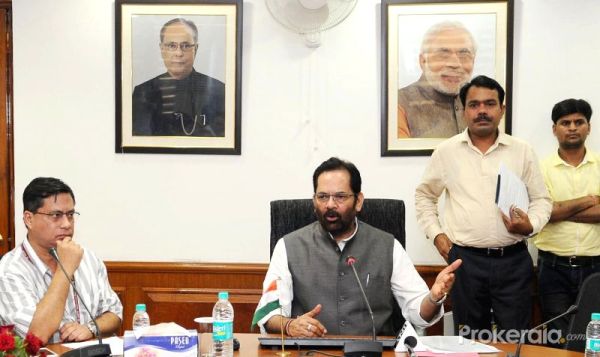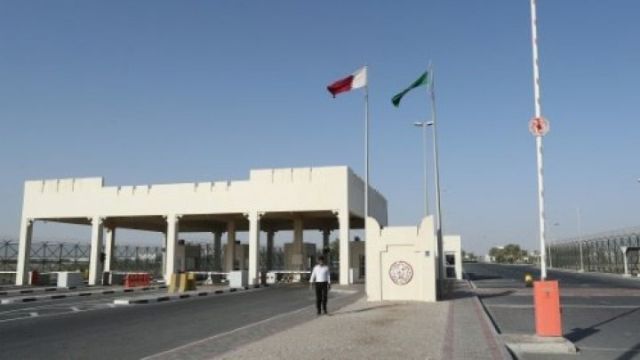
by admin | May 25, 2021 | News, Politics

Representational image
New Delhi : Taking ahead the process of ferrying Haj pilgrims to Saudi Arabia by the sea route, the government has floated global tenders for roping in shipping companies and the operations may start as early as the next Haj season, Union Minority Affairs Minister Mukhtar Abbas Naqvi informed on Monday.
“There has been much progress on this front. The Saudi Arabia government’s consent has already been obtained and now we have floated global tenders to rope in shipping companies to ferry Indian Haj pilgrims to Jeddah,” Naqvi said.
“We have set a target to complete all the process by 2019. However, there are many other things which we need to consider including the security of the pilgrims as there are some stressed stretches on the route such as Syria. If everything goes right, we may be able to ferry the pilgrims from next year itself, that is, Haj 2019,” he added.
Travelling by ship is likely to significantly reduce the travel cost and make Haj affordable to many more people, Naqvi said. However, the Minister said, it was hard to tell at this point how much the actual reduction in the fare would be.
“Initially, there would be only one embarkation point for the pilgrims choosing to travel by sea and it would be Mumbai. The modern ships can cover the 2,300-odd nautical miles distance between Mumbai and Jeddah in three to four days,” Naqvi said.
Haj travel by sea was discontinued in 1995 as MV Akbari, the ship which used to ferry the pilgrims, aged and became unfit for use. The idea to revive the sea route was mooted by the Minority Affairs Ministry last year to offset the effect of the subsequent withdrawal of subsidy.
The government has withdrawn the Haj subsidy from this year. However, the cost has not gone up drastically, as had been feared, due to a number of effective steps taken by the government such as negotiating with the airlines to rationalise the air fares and giving the pilgrims the option to choose their embarkation point.
This year, 1,75,025 pilgrims from India will go for Haj. Of these, 1,28,702 pilgrims will go through the Haj Committee of India — which includes about 47 per cent women — while 47,323 Haj pilgrims will go through private tour operators, Naqvi said.
A total of 3,55,604 applications had been received for Haj, including 1,89,217 male and 1,66,387 female applicants.
Besides, for the first time Muslim women from India will also go to Haj without ‘mehram’ (male companion). A total of 1,308 women applied to go for Haj without mehram and all of them have been granted permission by the government.
“This year, we are also setting up two 40-bed hospitals in Mecca, one 15-bed hospital in Medina, 10 branch dispensaries in Mecca, three dispensaries in Medina and one at Jeddah Haj terminal to provide better healthcare facilities to the Indian Hajis,” Naqvi said.
—IANS

by admin | May 25, 2021 | News, Politics
 New Delhi : The Supreme Court on Tuesday directed the earmarking of an “exclusive quota” for Haj pilgrims aged 70 and above and preference being given to pilgrims in the age group of 65 to 69 years who have already applied for the pilgrimage five times or more.
New Delhi : The Supreme Court on Tuesday directed the earmarking of an “exclusive quota” for Haj pilgrims aged 70 and above and preference being given to pilgrims in the age group of 65 to 69 years who have already applied for the pilgrimage five times or more.
The bench of Chief Justice Dipak Misra, Justice A. M. Khanwilkar and Justice D. Y. Chandrachud said that people who have crossed 70 years would get the benefit of a separate exclusive quota and those between the age group of 65 to 69 who have applied five times or more would also get the benefit of preferential consideration for the pilgrimage.
The court order came in the course of the hearing of a plea by the Kerala Haj committee seeking more quota for the Haj pilgrimage as it has far more applicants and not many of them can be accommodated.
It has contended that Bihar, which gets more quota for Haj pilgrims, is not able to utilise it as there are not many applicants there.
Having directed the creation of a separate Haj quota for pilgrims who have crossed 70 years of age, the court ordered the listing of the matter for July 10 for final hearing.
—IANS

by admin | May 25, 2021 | Muslim World

Mukhtar Abbas Naqvi
New Delhi : The Indian government’s proposal to send Haj pilgrims through the sea route has got the green signal from the Saudi Arabian government, Union Minority Affairs Minister Mukhtar Abbas Naqvi said on Monday.
The discussion on reviving the sea route came up during the signing of the annual bilateral Haj agreement for 2018 between India and Saudi Arabia in the presence of Naqvi and Saudi Minister for Haj and Umrah Mohammad Saleh bin Taher in Mecca on Sunday.
Naqvi said officials from both the countries will discuss all the necessary formalities and technicalities so that Haj pilgrimage through the sea route can commence in the coming years.
“Sending pilgrims through ships will help cut down travel expenses significantly. It will be a revolutionary, pro-poor, pilgrim-friendly decision,” Naqvi said.
The ferrying of Haj pilgrims between Mumbai and Jeddah by waterway was stopped in 1995.
The Minister said that another advantage with ships available these days is they are modern and well-equipped to ferry 4,000 to 5,000 persons at a time. They can cover the 2,300-odd nautical miles one-side distance between Mumbai and Jeddah in just three to four days.
The old ships used to take 12 to 15 days to cover this distance.
Naqvi said that last year he had discussed the option to revive sea route for Haj pilgrimage with Transport and Shipping Minister Nitin Gadkari.
He said that Haj 2018 has been made fully digital.
On the issue of Indian Muslim women going to Haj for the first time without mehram (male guardian), the Minister said that separate accommodation and transport has been arranged for these women.
Also, female Haj Assistants will be deployed for their help.
More than 1,300 women have applied to go for Haj without mehram and all of these women will be exempted from the lucky draw. These women would be travelling in groups of four or more women, according to the new Haj policy of India.
So far, around 3.59 lakh applications have been received for Haj 2018, against the quota of around 1.70 lakh pilgrims.
“For the first time, we have given option to Haj pilgrims to opt for another embarkation point. This will ensure that there is no financial burden on Haj pilgrims even after removal of Haj subsidy. This decision has received overwhelming response,” Naqvi said.
—IANS

by admin | May 25, 2021 | Muslim World
 Riyadh : Saudi Arabia announced on Thursday that it is reopening its border with Qatar to allow Qatari pilgrims attend the Haj, the state media reported.
Riyadh : Saudi Arabia announced on Thursday that it is reopening its border with Qatar to allow Qatari pilgrims attend the Haj, the state media reported.
The Salwa border crossing had been shut after Saudi Arabia, along with the United Arab Emirates (UAE), Egypt and Bahrain severed diplomatic and trade ties with Qatar in June, accusing it of supporting and funding Islamist extremist groups.
According to the Saudi Press Agency (SPA), the announcement to reopen the border for Qatari pilgrims came after the Saudi Crown Prince Mohammed bin Salman met Qatar’s Sheikh Abdullah bin Ali bin Abdullah bin Jassim Al Thani, in the first high-level public encounter between the countries since the crisis erupted.
Qatari pilgrims wishing to attend the Haj will be able to pass through the Salwa border crossing without needing electronic permits, a statement on the SPA said. The pilgrims would also be welcome through Saudi Arabia’s airports, it added.
“All Qatari pilgrims be transported from King Fahad International Airport in Dammam and Al-Ahsa International Airport as his (King Salman) guests. All expenses are to be paid for by the King, under the Programme of the Guests of Custodian of the Two Holy Mosques King Salman bin Abdulaziz Al Saud for Haj and Umrah,” the statement said.
Saudi state TV said 100 Qataris had arrived at the border crossing on Thursday.
In July, Saudi Arabia had warned Qatari pilgrims would face certain restrictions if they wanted to the attend the Haj. Qatar responded by accusing Riyadh of politicising the Haj and the UN special rapporteur on freedom of religion expressed concern at Saudi Arabia’s measures, BBC reported
In a statement carried by SPA, the Crown Prince thanked Sheikh Al Thani “for his brotherly feelings” as he stressed “the depth of historical relations” between Saudis and Qataris.
Observers say that, despite this goodwill gesture, the dispute between Qatar and its neighbours, Saudi Arabia, Bahrain, Egypt and the UAE is far from over, the BBC report said.
—IANS

by admin | May 25, 2021 | News, Opinions

By Dr Syed Zafar Mahmood, President, Zakat Foundation of India
On 11 and 24 September 2015 two incidents occurred in the Muslim sacred Hejaz region of Saudi Arabia causing death of 935 Haj pilgrims and grievous injury to 1,257. Including these, from 1975 till date, 14 mishaps have occurred in which 4,476 devotees have died and a much larger number got injured to various degrees. Thus during the last 40 years every alternate year a man made incident has taken place resulting in, on the average, death of 112 pilgrims coming from all over the world who according to Islam were the Guests of God in the holy land. This is not only a cause of pain and agony for the pilgrims and tens of thousands of their family members but also a source of embarrassment for Saudi Arabia and the world Muslim community.
Causes of tragedies
The factors responsible for these tragedies have been (a) inadequate traffic control inside the tunnel from Makkah to Mina and Arafat and on the bridge leading to Jamaraat (the triple satans), (b) lack of planning to channelize the flow of pilgrims while they stone the satans (this is known as Rami), (c) insufficient preventive measures against fire, (d) absence of modern expertise among the security personnel and (e) substandard training of staff deputed to handle vital machines at expansion sites.
Spiritual pleasure versus safety concerns
The community’s reverence toward Haj is undeterred and so is the spiritual value of getting buried in the holy precincts. In 1975 my father too peacefully expired while lying in Makkah after completing Haj and is buried in Jannat-Al-Ma’ala, the graveyard in the vicinity of the Prophet’s companions. May he and all others who have gone from this world be bestowed with high place in paradise, Amen. But more vital is to ensure that for millions of world pilgrims of different age groups with no urgent wish to die, there are in place flawless arrangements to circumambulate the Kaaba, running between the hillocks of Safa & Marwa, standing at Arafaat, overnight stay in Muzdalifa and stoning of the satans and happily go back home.
Saudi statements after tragedies
After this month’s twin tragedies the Makkah Governor followed by the Central Haj Committee Chairman prince Khaled have constituted the investigation committees. However, even before the second committee could pull up its socks and begin working, Prince Khaled has told the Saudi tv Al-Arabiya that for the latest mishap the pilgrims themselves are responsible as they did not follow the rules. That can be said in respect of all traffic accidents anywhere in the world. In the twenty first century of ‘welfare state’ violation of traffic rules cannot be taken as sufficient to prejudge an un-investigated occurrence killing 717 persons in one go.
Saudi Interior ministry’s spokesperson Mansoor Al-Turki says that the outer limits of Mina and Mashhar are predetermined and the available space cannot be further expanded. But, what about vertical expansion on which there is no cap? Moreover, if there’s faith-mandated space crunch, the obvious concomitant is that more than the corresponding number of those who can be comfortably accommodated should not be invited even if it goes against the demands of the local economy.
Science of tower cranes
The investigation committee on crane crash has attributed the fall to the unexpectedly fast wind. The contractee Saudi Binladen company’s engineer says that the crane was affixed properly and it’s fall was an act of God. In this context it’s important to know that air is a mixture of gases with given density. With the blowing air, the gas molecules move speedily and imbibe energy. Striking a surface, the air retards but the molecular energy causes forceful pressure. Doubling of the wind speed quadruples the wind pressure; it goes further up at higher elevation.
Cranes: International Code for safe use
It is for ensuring utmost precaution in such a delicate handling and yet preempt a mishap that a Code of Practice for Safe Use of a Tower Cranes has been devised and uploaded online in USA, Canada, UK, Europe, Australia and India. But on any Saudi Arabian website this is yet to be seen. According to this Code it is mandated that on each tower crane there is affixed an Anemometer to continuously measure and report the wind speed. Also, the staff incharge of the crane is bound to be always in touch with the weather forecast centre. Wherever needed the tower crane has to be vertically tied backwards with a stable hook. Also, it is important to regularly check the anchorage and ballast of the tower crane. The special yearly permit is to be obtained in respect of each crane. The world Muslim community would like to know that in case of the fallen crane of Makkah if these requirements were not fulfilled then who was responsible for such dereliction and what punishment has been awarded to the culprits.
Invite international tenders
In the 21st century world no nation is supposed to be expert in every field. Even the USA takes pride in importing the required expertise from different parts of the world. Saudi Arabia too does that in many departments. But for managing the enormous affairs of the two holy cities it still depends upon local amateurish help while this responsibility engulfs the entire Muslim community of the world. If the same incumbents do not keep on performing the same chores year after year the system is saved of the ill effects of monotony. Conversely, in Saudi Arabia the same set of persons and families have been engaged in the same works of Haj management for a long time even, in some cases, germinating vested interests. That needs to be substituted by well planned interventions through open international tenders.
Appoint world class experts
Obviously, the expanse of the city of Makkah is scripturally confined to the believers. But, first class experts even from beyond can be invited to sit outside the periphery and yet plan, control, supervise and monitor – like the Kingdom happily does in many areas of its activity. In any case, the provision of top quality world expertise in no section of Haj management should ever be compromised.
Saudis will do well to rope in an international group of experts in different fields of Haj management – mass movement, traffic control, crowd planning & management, public relations – who should prepare a well considered annual action plan of what should be done when and by whom and meticulously act thereupon. The institutions of Mu’allim has since lost its utility and needs to be discontinued. Haj management should be entrusted to young & experienced Muslim graduates of the world’s most acclaimed universities in different fields including public administration and management; and internally they should be continuously transferred from one seat to another in order to preempt sprouting of vested interests.
Rope in most qualified, certified, experienced Muslim youth
For expansion work in the holy cities too international tenders should be invited; world’s ablest, certified and most experienced companies should be given contracts rather than circulating these among a few Saudi companies even though they don’t have that kind of updated competitive qualifications, experience and certification. For the inspection and monitoring of their work another set of similarly qualified, experienced and certified companies should be appointed. In the world there are 56 Muslim countries and even apart from these there is no dearth of Muslims that match the best in the world and they’ll surely consider such service as a spiritual boon.
———





